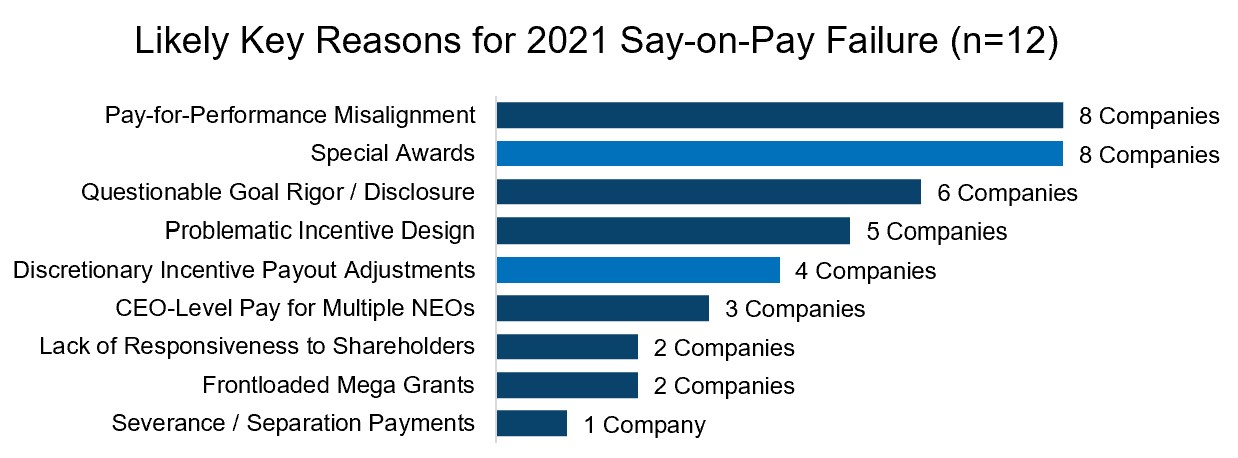Halfway through 2021 Say-on-Pay Voting, S&P 500 Failures Approach All-Time High
By Daisy Laska, Thomas Kohn
Share
Through May 13th, about half of S&P 500 companies (251 companies) have held their 2021 annual advisory shareholder vote on executive compensation (“Say-on-Pay”). Twelve companies have already failed, approaching the record number of failures (13 in 2012)1,2. S&P 500 companies in 2021 are on pace to double the 2020 Say-on-Pay failure rate (11 companies) and triple the failure rates from 2019 and 2018 (7 each). While Say-on-Pay is non-binding, a failing vote (<50% support) indicates majority shareholder disapproval of a company’s pay practices and can lead to an “Against” vote recommendation from the proxy advisory firms for the election of the chair and other members of the committee responsible for administering the executive compensation program in subsequent years if the committee does not demonstrate adequate responsiveness to shareholder feedback. The analysis below identifies two factors that appear to be contributing to the increased failure rate this year:
1. Discretionary Incentive Adjustments/Special Awards:
The realizable value of executive pay declined across many industries in 2020 due to the economic impact of the COVID-19 pandemic. Some companies took special actions to offset this decline, in many cases drawing shareholder ire. Four of the 12 companies that failed Say-on-Pay thus far in 2021 made positive discretionary adjustments to annual and/or long-term performance incentive payouts in 2020, while eight companies granted special LTI awards that may be fully or partially intended to offset the COVID-related declines in realizable compensation value (three companies took both special actions). These types of actions were anticipated by the proxy advisory firms, which in 2020 indicated that they would evaluate such actions on a case-by-case basis, considering the magnitude of the adjustments or retention awards, transparency and rationale disclosed, and company performance, among other factors. Notably, all four of the companies that adjusted incentive payouts had other “problematic” pay practices present (e.g., quantitative pay-for-performance misalignment, incentive design features that are not aligned with “best practices”, lack of responsiveness to shareholder feedback following a previous low Say-on-Pay vote, etc.). When coupled with other pay practices that may be objectionable but not so severe as to lead to Say-on-Pay failures, discretionary adjustments to 2020 incentive payouts and/or special retention awards were likely the last straw that dragged shareholder support below the 50% threshold for some companies.

2. Influence of an ISS “Against” Vote Recommendation:
Average shareholder support for Say-on-Pay among companies that received an “Against” Say-on-Pay recommendation from a leading proxy advisory firm, Institutional Shareholder Services (“ISS”), has declined in each of the past two years and is down from 66% in 2019 to only 57% in 2021. Notably, ISS recommended that shareholders support Say-on-Pay proposals at about the same rate in each of the past three years (~90% frequency), and the average shareholder support rate among the companies that received “For” recommendations is roughly flat (low 90% range). In other words, shareholder support for Say-on-Pay is generally about the same as in prior years, except when ISS recommends “Against” Say-on-Pay (~10% of the time), in which case the shareholder support rate is trending down. This data may signal that ISS’ influence is growing among investors.

FW Cook will continue to monitor Say-on-Pay trends and provide periodic updates on notable developments throughout the year.
1 The 12 companies that failed thus far in 2021 are: AT&T, General Electric, IBM, Intel, Marathon Petroleum, Paycom Software, Phillips 66, Prologis, Skyworks Solutions, Starbucks, TransDigm Group, and Walgreens Boots Alliance.
2 At least two more companies have failed Say-on-Pay since May 13th while research for this article was being conducted, meaning that 2021 will see the highest number of failures since Say-on-Pay was instituted in 2011. Due to a lag in reporting Say-on-Pay voting results, this analysis is based on the comprehensive sample of companies with shareholder meetings on or before May 13th.
 Daisy Laska
Daisy Laska
Consultant
Daisy Laska works with clients across a wide range of industries, ranging from large publicly traded organizations to smaller publicly traded or privately held companies. She provides consulting services in various areas of compensation matters, specializing in director compensation benchmarking, executive compensation trends, peer group development, and annual and long-term incentive program design.
